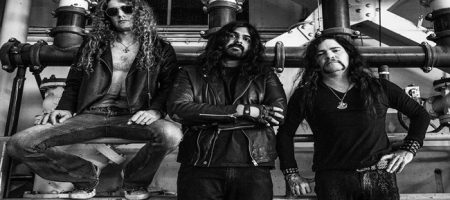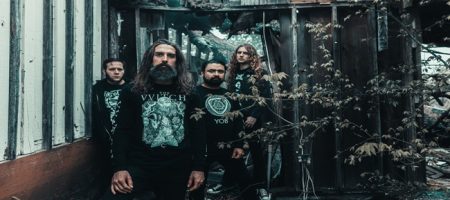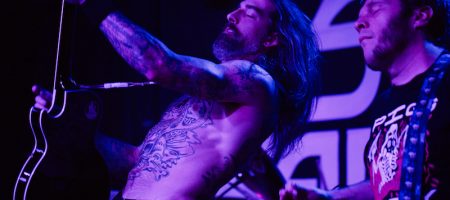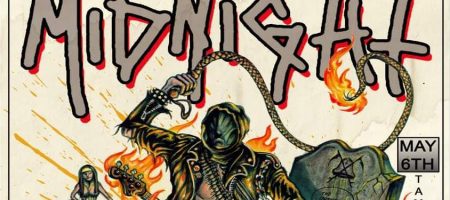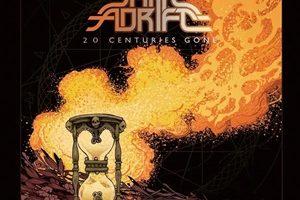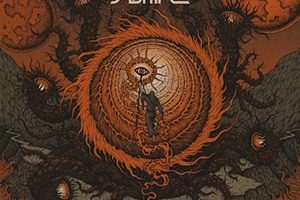Spirit Adrift – Effective in Efficiency
Tuesday, 17th August 2021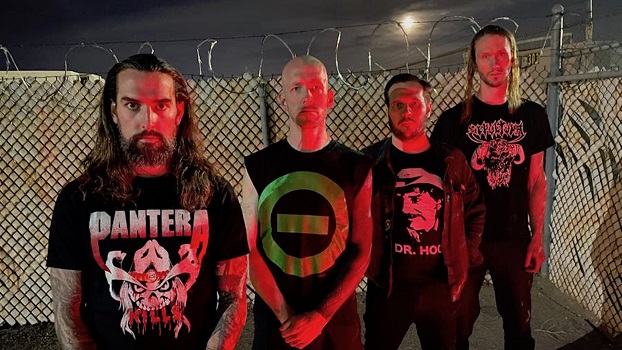
Grabbing influences from numerous 70’s/80’s artists across the classic rock, metal, psychedelic, and southern rock scenes, Spirit Adrift have made a steady impression moving up the ranks for their brand US heavy metal. Originating from more of a doom stance in their early years, they’ve evolved to incorporate more traditional metal touches. Their latest EP Forge Your Future contains three more original songs, showcasing all sides of their sound: epic, catchy, melodic, harmonic, soulful, reaching into the heart of all music followers.
We spoke with drummer Marcus Bryant who was happy to let us in a bit to the world of Spirit Adrift. You’ll learn more about the man’s wide array of influences, the prolific nature of songwriting for the group, how the working relationship with Nate Garrett is unlike any he’s ever had with another musician before, memorable shows in Europe and the US, plus what may be on the horizon for shows/output at the end of the year into 2022.
Dead Rhetoric: Tell us about your earliest memories surrounding music growing up – and at what point did you discover heavy metal and eventually want to pick up an instrument to perform in bands?
Marcus Bryant: I grew up in a musical family. I had two older sisters, they sang and played instruments, my mother sings and plays. I started really with my parents’ records and what they were listening to, soul music, blues, the Motown records. My mom loved gospel music, The Beatles, all of that good classic rock and blues kind of stuff. I would say I have been banging on pots and pans like little kids do, growing up. When I was around 11, 12 something in there, I would steal my older sister’s cassette tapes, and when I found Metallica’s black album, that was the first metal album I heard that I said, this is mine! And then the next thing was, I want to do that, play drums. That was the beginning for me for finding heavy metal and wanting to play it. And I haven’t looked back since.
Dead Rhetoric: Did you end up taking formal drum lessons after that point?
Bryant: I did, very briefly. My brother and I, he started playing bass at the same time I started playing drums. We would just jam together and learn our favorite songs: Black Sabbath, Motorhead, stuff like that. I took lessons from someone for only a few months, and then he died in a car accident so I never took lessons after that. It was primarily self-taught, jamming along with the records that I loved.
Dead Rhetoric: The latest record for Spirit Adrift is a three song EP entitled Forge Your Future. What can you tell us regarding the recording and development of this material – which comes ten months after your last full-length Enlightened in Eternity?
Bryant: Yes, like you said we had just put out Enlightened. Nate never stops writing. In light of the pandemic and everything that was going on with that, we wouldn’t be able to tour. It was one of those things where we just can’t sit still for too long, we go a little crazy. He put together eight songs, we collaborated on the drums, and we decided to put out another release. It’s our first release solely by Century Media. It was something to put out with them. Get ready to go back on tour. We wanted to have something to put out there. We don’t like idle time.
Nate presented the songs, we went back to Ryan Bram at Homewrecker Studios in Tucson, we had worked with him in the past. Nate flew out from Texas, and I drove down there and we tracked this thing inside of a week I believe. We are super happy with how it turned out, and happy to work with the people that we worked with.
Dead Rhetoric: What can you tell us about the cover art – as its very intriguing in a sci-fi meets left field way, especially in terms of the scenery, creatures, and color scheme choices?
Bryant: Oh yes. The artwork, Nate found that artist Kuba Sokolski, I believe he is out of Poland. The artwork has always reflected the lyrical content and the message of this band. The artwork is very complimentary to the subject matter on the EP. Dealing with… without breaking out Nate’s lyrics literally. I like the songs to mean many different things to many different listeners. The music… it just fits with this vibe that we have, this style of heavy metal that we are playing. The artwork is a reflection of what’s being sung about in these three songs. There is a psychedelic aspect, it also looks cool. It’s meaningful and it expands upon the overall piece, the release of the EP. And it looks awesome!
Dead Rhetoric: Speaking of lyrical content, I know you don’t want to necessarily specify Nate’s outlook song to song, does he try to have a mixture of realism along with the fantasy/fictional aspect to his lyrics?
Bryant: His lyrics, he definitely draws from real experiences, life experiences he’s had. Him and I are always talking about what’s going on in the world, ourselves personally. He draws from a little bit of everywhere: what he sees, what he experiences. And I know they are very personal and very real. People had referred to us more as a doom band, or a metal band, and there are expectations that come with that. We like to leave things open to interpretation, and not want to explain it away. They are real life, real stuff – dark experiences and a delivery of hope. Our interest in Eastern philosophies, stoicism, paths to bettering oneself, not giving up. Those are themes that are explored in this band.
Dead Rhetoric: How would you describe your relationship with Nate Garrett, and do you trust his vision and songwriting/performances within Spirit Adrift, especially how the band has evolved over the years?
Bryant: For sure. Nate is like a brother to me. I think we just realized earlier today I have been jamming with Nate for five years. We first jammed together in August of 2016. That is when we first started putting together a live band. Since then, we clicked right away. We want the same things out of music, which is obviously the most important thing. That’s our outlet. We have a serious love for heavy metal, classic rock, blues. Nate turned me on to a full-blown country fan.
The friendship has been amazing, the working relationship is super efficient. It’s so much fun. We are always talking and texting about this artist, that artist, whatever. He will shoot me over demos, and it’s great to be cool, putting some drums together, send stuff over, talk about it. Everything that we do is to serve the song. It’s not about one instrument in the band, it’s more about what is going to yield the greatest results. Having that similar mindset that we do, how we like to work together, and be very efficient. It will weird some people out – they ask us if we like to jam. Well, we jam, but we now live in different states. It’s a lot of conversation, he’ll send me a bunch of material and I’ll get to work. As fun as it is to write songs and jam, there is a place for that. We’ve found in this band with our personalities, it works to do our work at home, and then be a band when we get together. Everyone knows their parts, knows what they are doing – bam, bam, bam, it’s just tight.
Dead Rhetoric: Do you believe it’s easier to be prolific because of the understanding of what each musician can do and just get down to work?
Bryant: I do think that, that plays a big role. Having a similar mindset is absolutely critical to getting the work we did done in a timely fashion. Jamming with Nate is the first time I’ve been in a band with someone who I felt was as obsessive and as crazy as I was in every aspect of the music, the band, and how it works. He has that same organization. Pulling their own weight. We have all been in bands where like certain members show up and don’t do much. And that’s not the case here. And it’s been amazing. We are not going to be happy if we are not busy. We find ways to stay busy, while maintaining that efficiency.
Dead Rhetoric: What is your outlook and philosophy as a drummer? How would you describe the trademarks or components of your style – and who do you think influenced your approach or outlook at drumming?
Bryant: Drumming for me. Drumming is the greatest activity in the world. I wouldn’t trade it for nothing. That being said, I’m not a drummer’s drummer, I don’t believe. I love songs so much. I want to serve the song in the way that some of my biggest influences served the song. Metallica was my launching point. Some of my biggest influences, Vinnie Paul from Pantera, the way that guy, he knew when to lay back and knew when to get more technical. His approach to rhythm, similar to ZZ Top. I have often joked and said that Black Sabbath was my brother and I’s music teacher. Covering their songs – Bill Ward, John Bonham, Vinnie Paul, Igor Cavalera. Some of those early Sepultura records. Sean Kinney from Alice in Chains. That drumming that serves the song, that is the approach I like to take. What can I bring to the song to not get in the way of it, not be too busy. I want to let the song breathe when it calls for that, and get down with some double bass when that is called for.
Dead Rhetoric: How have you personally handled the long downtime away from shows and tours with the pandemic? Have you picked up any new activities, hobbies, and/or passions to fill your time beyond the music activities?
Bryant: Like a lot of people, I did my best to stay busy. I thought for two to three months I had this – we were jamming. After a while though, you become disenfranchised and wonder when is the world opening up again? I didn’t pick up many new hobbies, I love going out here in the desert around Phoenix, go four-wheeling, hiking, camping. Shoot guns and stuff. Spend a lot of time with my dog and wife. Stare at the house and go, ‘we should update this’. I don’t think my time off in quarantine was too different than it was for a lot of people in my position. I stayed busy with music as much as I could. I got out of the house as frequently as I could. Just white-knuckled it, more or less.
Dead Rhetoric: Where do you see the major differences in the current generation of musicians developing and releasing heavy metal in comparison to the classic artists that set the standards during the 70’s and 80’s?
Bryant: The differences? The music industry is different now, back in the 80’s it was video and touring, now it’s the internet and streaming. Nate and I love classic albums, band bios all that stuff. We digest that as much as possible. The way we approach writing, getting together to record and rehearse, a lot of the bands of the 70’s had bigger budgets and could afford to jam in a studio. That would be a dream of course, to have all that arsenal of gear at our disposal.
We are doing the same thing our favorite artists have done. Write the music that’s inside of us, play the music that’s inside of us. The primary human emotions are still the same. Anger, fear, hurt, love, whatever it may be. These are human experiences that are more or less the same, and our approach to playing music isn’t too dissimilar to what those older artists have done. I’d like to think that anyway. The differences being, we have never recorded to tape. The older bands had the ability to capture that live energy. We do not like doing all this heavy editing and getting all crazy in ProTools. We like to keep the raw performance and that energy. To us, that’s the main thing.
Those old records in the 70’s and 80’s, when you hear those little mistakes, changes in tempo. A lot of those mistakes end up becoming my favorite parts of those records. That’s weird, the little squeak of the drum pedal on an old Led Zeppelin record. That’s something that more bands did back in the day because of the nature of the recording process. Nate and I try to capture that live energy in the studio to try to preserve as much of that spirit or soul of the session as possible.
Dead Rhetoric: How would you describe the Spirit Adrift philosophy when it comes to your live performances versus the studio recordings? What have been some of the most memorable shows to date with the band?
Bryant: We want to play as true to the recordings as possible. These songs are written to be played a certain way. We want to play them live. Playing live is what the whole thing is about. Playing music is a community event, a swapping of energy. We get to get up there on this stage and play these songs that you get feedback from the crowd that you return back. There is this incredible loop and swap of energy. Historically music was played in community centers by the community, I like to think of this as a continuation of that. It’s the best place to be, my number one spot to play live. If I could play live every single day for the rest of my life, I would probably sign up for something like that.
We have had so many great shows. Our European tour with Sanhedrin, we played some shows in Germany and the Netherlands that were next level. The last show, because of the pandemic, the Aftershock festival and the Decibel Metal and Beer Festival in Los Angeles. That one was December of 2019. Those festival dates are always fun, you get to play in front of a bunch of people you wouldn’t play to otherwise. Some of my favorite shows… too many venues I can’t remember. We played this festival in Canada with High on Fire, and we are getting ready to play with them again. I love Canadian audiences. We played in Montreal, it was so incredible. That would be one of my favorite shows I have ever played.
Dead Rhetoric: If you had the opportunity, time, and energy to teach a high school or college level course that you created about any specific subject matter outside of the field of music, what would you like to teach and why?
Bryant: Woah! That’s an awesome question. Outside of music. I don’t know if this is a course somewhere. I would probably do some sort of physical, outdoors activity. Like if I could teach, off-road racing, or teach scuba diving. Some activity like that, I am talking more of a trade than a real course. I would love to teach philosophy, but I am a casual fan of it. I have no means to teach that subject, so I would stick more to a physical activity. I have a surplus of energy and have a lot to get out. I would want to work with people who also have a surplus of energy. Let’s ride motorcycles, let’s go racing around in the desert, that would be a good time.
Dead Rhetoric: How do you feel about the record labels that you work with 20 Buck Spin and Century Media – are they very supportive and understanding of what Spirit Adrift is trying to achieve and put across with your music?
Bryant: Absolutely. Both labels have been phenomenal. Dave at 20 Buck Spin is like family. He helped this band out so much. He believed in us from the very beginning. He’s always stood behind us. He has allowed our vision to come across. This opportunity with Century Media presented itself to us, and Dave said, go for it. It’s time for us to step up, more exposure and more eyes on us. And having that from him was amazing. I love and respect him as a friend, and a music fan as well as a businessman. Century Media has been amazing along the way. Their communication has been phenomenal. They’ve allowed us like 20 Buck Spin to do what we want to do. Both of us have been very happy with both labels.
Dead Rhetoric: What’s on the agenda for Spirit Adrift during the next twelve months- and do you have any other musical endeavors that we can look forward to down the line?
Bryant: We are going to get this EP release. We have a show in Phoenix in October. We will fly to New York and play two shows with High on Fire and Dysrhythmia. Come back from those, and I don’t want to say too much. Nate is always writing, we have more in the works, and you will see us more on tour. We are dying to get back on tour.
Spirit Adrift official website











